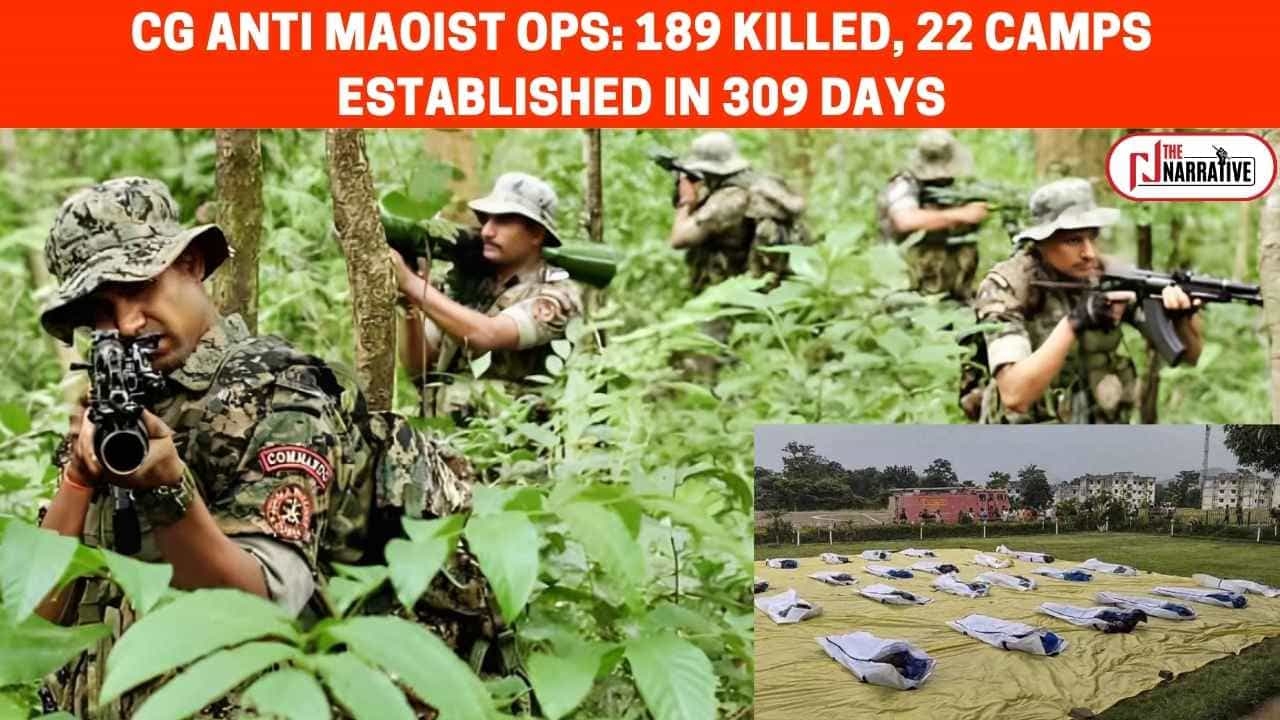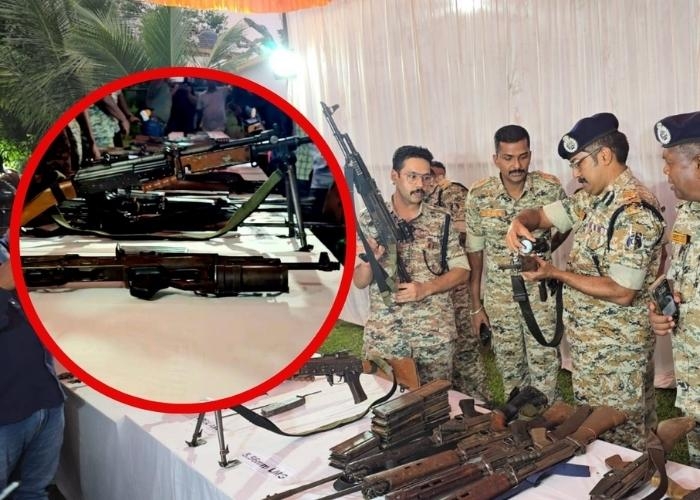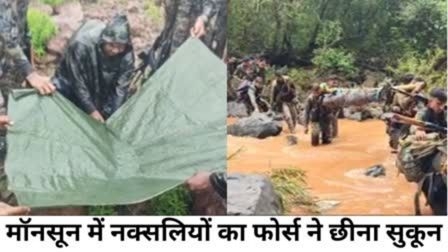Chhattisgarh Forces Kill 189 Maoists in 309 Days
Security forces in Chhattisgarh have killed 189 Maoists in Bastar during 96 encounters this year, seizing over 200 weapons and setting up 22 new security camps.
Total Views |

A Year of Success Against Maoists
In a major blow to Maoist activities, security forces in Chhattisgarh's Bastar region have killed 189 Maoists in 309 days this year.
Between January 1 and November 5, a total of 96 encounters took place across different districts, resulting in the deaths of Maoists worth Rs 9.72 crore in rewards, including five high-ranking Dandakaranya Special Zonal Committee (DKSZC) members.
Police recovered 207 weapons, including AK-47s, SLRs, and INSAS rifles, which Maoists had previously seized from the forces. This year marks a significant success in Bastar's anti-Naxal operations, with officials calling it the biggest achievement in the region since Chhattisgarh's state formation.

The efforts of the security forces have also boosted the morale of local villagers, who have witnessed a reduction in Maoist influence and fear in their communities.
New Camps in Maoist Heartland
Security forces have also established 22 new camps in areas previously under heavy Maoist control, including the notorious Abujhmad region.
Known as the "capital" of Maoists, Abujhmad has long been considered a stronghold, but this year, police successfully increased their presence, conducting multiple encounters deep inside the territory.
The establishment of these camps is seen as a major step towards dismantling the Maoist network and bringing governance to areas that have been neglected for years.
The presence of security forces has encouraged development activities, such as road construction and health services, which were previously hindered by Maoist threats.
The new camps have not only strengthened security in these remote areas but also provided a sense of safety to the villagers. Many local residents have expressed their relief at the increased police presence, which has allowed them to carry out their daily activities without constant fear of Maoist reprisals.
The police have also been engaging with the community, providing medical assistance and organising outreach programs to build trust and support among the locals.
Success in TCOC and Monsoon Operations
Maoists usually launch their Tactical Counter Offensive Campaign (TCOC) from March to June, a period known for attacks on security forces, like the Tadmetla and Burkapal ambushes.
However, this year, police outmanoeuvred Maoists during their TCOC, conducting joint operations that neutralised several terrorists.
The proactive approach taken by the security forces prevented major attacks and significantly weakened the Maoist ranks during this critical period.
Monsoon operations were also effective, with forces crossing rivers and streams to infiltrate Maoist camps, destroy their bases, seize weapons, and recover bodies of killed Maoists.

Despite the challenging terrain and harsh weather conditions, the forces managed to maintain pressure on the Maoists throughout the monsoon season.
The successful monsoon operations demonstrated the determination and resilience of the security forces, who continued their efforts even in adverse conditions to ensure that Maoist activities were curtailed.
The combination of TCOC and monsoon operations has dealt a severe blow to the Maoists, disrupting their plans and forcing them to retreat from many of their established positions.
The security forces' coordinated strategy has been praised by officials, who believe that these operations have set the stage for further successes in the coming months.
Top Maoist Leaders Eliminated
Among the 189 Maoists killed were five high-ranking DKSZC members, including Niti alias Nirmala, Rupesh, Randhir, and Joganna, each carrying Rs 25 lakh bounties. Security forces also neutralised several Division and Area Committee Members (DVCM, ACM), as well as LOS, Platoon Commanders, and PLGA members.
The elimination of these top leaders has created a leadership vacuum within the Maoist ranks, which could lead to further disarray and weaken their organisational structure.
The neutralisation of key Maoist leaders has been a significant achievement for the security forces, as it has disrupted the chain of command and reduced the Maoists' ability to coordinate large-scale attacks.
This has also sent a strong message to other Maoist terrorists that their activities will not go unpunished, and the forces are committed to eliminating the threat they pose to the region.
Camp Establishments Transform Villages
Security camps have been set up in 22 interior villages across Bastar, transforming the situation in these areas. Thirteen of these villages even celebrated Independence Day for the first time, highlighting the growing influence of the state. Locations include Dantewada's Nerli Valley, Kanker’s Panidobri, Bijapur’s Gundam, and Narayanpur’s Kasturmeta, among others.
The establishment of these camps has brought a sense of normalcy to these remote villages, with development projects now gaining momentum. Roads, schools, and healthcare facilities are being built, and the government is making efforts to improve the quality of life for the residents.
The security camps have also provided employment opportunities for the locals, who are being hired for construction and other development work, thereby giving them an alternative to supporting Maoist activities.
The presence of security forces has also led to increased cooperation between the villagers and the authorities. Many villagers have come forward to share information about Maoist movements, which has helped the police in planning their operations more effectively. The transformation in these villages is a testament to the positive impact that sustained security efforts can have on previously neglected areas.
Operations Continue, IG Appeals to Maoists
Bastar IG Sundarraj P, in an interview, confirmed that operations against Maoists are ongoing and have seen success against top Maoists terrorists.

He urged Maoists to surrender and join the mainstream, promising a better future. The IG emphasised that the government is willing to provide rehabilitation and support to those who lay down their arms and choose a peaceful path.
The police have also been actively distributing pamphlets and using local radio broadcasts to spread their message, encouraging Maoists to surrender. According to IG Sundarraj, several Maoists have already expressed their willingness to surrender, and the authorities are hopeful that more will follow suit. The surrender policy offers Maoists an opportunity to reintegrate into society, receive vocational training, and start anew, away from the cycle of violence.
The operations in Bastar are a part of a larger strategy to bring peace and stability to the region, which has been plagued by Maoists violence for decades.
With the continued efforts of the security forces and the cooperation of the local population, officials are optimistic about reducing Maoist influence and bringing lasting peace to Bastar.
Report by
Shomen Chandra
Sub Editor, The Narrative


